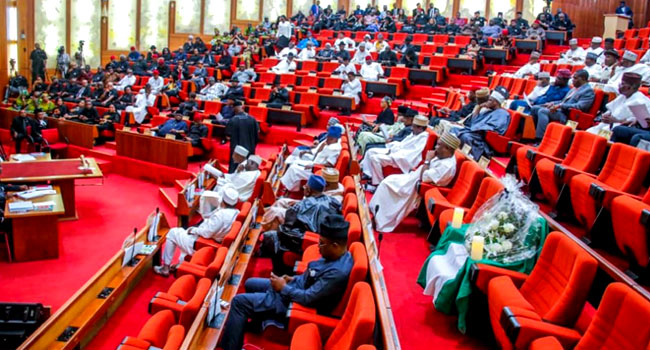599
By Lizzy Chirkpi
The Senate on Wednesday proposed the death penalty for kidnapping as part of sweeping resolutions aimed at tackling Nigeria’s worsening insecurity.
Lawmakers also ordered a full-scale investigation into the withdrawal of security forces from a secondary school in Kebbi State shortly before its invasion by ISWAP terrorists, an attack that left the Vice Principal dead and over 25 students abducted.
In the same vein, the Senate directed a probe into the killing of Brigadier General Musa Uba in Borno State, following allegations that his location may have been compromised by personnel within his own team.
As part of its resolutions, the Red Chamber demanded amendments to existing laws to make kidnapping a capital offence without the option of fine, describing the current wave of abductions as intolerable.
A Joint Committee consisting of the Committees on Defence, Army, Navy, Police Affairs and Interior was mandated to lead the investigations and report back within two weeks.
The Senate urged communities across Kwara, Kebbi, Niger and other affected states to remain vigilant and united, warning them to resist “internal collaborators who undermine national security.” It commended President Bola Tinubu and security agencies for their swift responses to recent attacks and urged them to sustain operations until all victims are rescued and perpetrators apprehended.
Lawmakers further called on the Federal Ministry of Works to commence immediate reconstruction of the Idofian–Omu-Aran–Eruku–Egbe–
In addition, the Army, Police, DSS and Defence Intelligence Bureau were directed to intensify intelligence-driven operations such as aerial surveillance, forest raids and inter-state collaboration. The Senate also recommended establishing a Joint Task Force (JTF) along the Kwara–Kogi axis, with forward operating bases in Eruku, Babanla, Oke-Ero and Isanlu.
To cushion the impact of recent attacks, the Federal Ministry of Humanitarian Affairs and NEMA were instructed to deliver immediate relief materials to affected families, especially in communities where schools have been shut down.
The Senate equally called for the strengthening of local vigilante groups and a review of Nigeria’s firearms laws “as obtained in over 175 countries where responsible citizens are permitted to own guns.”
Following a heated debate, the Chamber resolved that its leadership should brief President Tinubu on the decisions reached and encourage him “to persevere in his efforts.”
The motion, sponsored by Senator Lola Ashiru (Kwara South), detailed concerns over rising attacks across Kwara, Kebbi and Niger, including the Kebbi school abduction and alleged compromised military operations.
Deputy Senate President Barau Jibrin argued that the crisis could be resolved with international support. “We should seek assistance from overseas, urging collaboration with global partners to stem the crisis,” he said.
Senate Leader Opeyemi Bamidele described the situation as a pivotal moment, warning that “the nation risks losing the war unless decisive action is taken.” Although he welcomed the safe rescue of some abductees, he expressed concern that nothing was said about terrorists “being neutralized in the process.”
Senator Enyinnaya Abaribe insisted that the current government must take responsibility rather than blame previous administrations. Referring to the Kebbi school attack, he asked: “Who asked them? Nobody knows. If I were the Commander-in-Chief, I would demand answers.”
Senate President Godswill Akpabio also raised alarm over reports that Brig. Gen. Uba’s location was leaked, saying it suggested possible internal sabotage. His comments followed an uproar after Senator Seriake Dickson warned that Nigeria was “losing prestige and integrity before our eyes,” prompting APC lawmakers to protest and leading to Akpabio cutting off his microphone.
Akpabio condemned attempts to frame the crisis along religious or sectional lines, declaring: “This is orchestrated to damage the image of democracy. There is nothing like targeting Muslims or Christians. It is an attack on all. This country is under attack.”
Senator Adams Oshiomhole defended President Tinubu, arguing that he is performing under extremely difficult conditions. He demanded a probe into the troop withdrawal before the Kebbi attack, stating: “Who ordered the military to withdraw? That person should be tried for terrorism.” The Senate subsequently adopted the recommendation.
Oshiomhole also criticized inconsistencies within the justice system, noting that a convicted terrorist received a 20-year sentence while individuals who killed a bandit in self-defense were sentenced to death.



